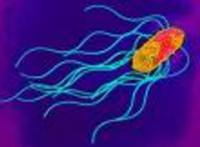New ways to reduce Salmonella in poultry

A research project at the University of Arkansas System Division of Agriculture will explore new ways to reduce Salmonella contamination of poultry.
The study will examine how effective certain antimicrobial treatments are in mitigating Salmonella and also conduct a genetic analysis of the Salmonella that survive the treatments.
Sara Milillo, a post-doctoral research associate at the Division of Agriculture Centre for Food Safety, has received a 2-year National Research Initiative postdoctoral fellowship grant for approx. $113,000 from the USDA.
“Though this is an experimental system, the results could be adapted for use in poultry processing,” Milillo said. “This future use could provide much needed insight into the gene regulation of Salmonella existing on chicken surfaces.”
Upon completion of the project, the researchers will develop strategies to use safe antimicrobial treatments to further reduce foodborne pathogens on poultry. Previous research has shown that injured foodborne pathogens can actually become more virulent after surviving attempts to reduce their levels through the use of antimicrobial treatments. This project’s efforts will be aimed at determining the treatments’ effects on Salmonella virulence gene expression.
The results are expected to develop a safe and mild antimicrobial treatment that can reduce Salmonella on poultry in addition to establishing a method for determining Salmonella’s genetic response to stresses from various combinations of antimicrobial treatments.
“This research will be beneficial long term to the food safety research community in establishing a system for evaluation of new antimicrobial treatments for safety and effectiveness on a genetic basis,” Milillo said.
Related link:
University of Arkansas System Division of Agriculture












